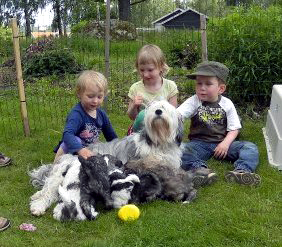|
Canine trainers tend to point out the problem as
being instinctive and although a range of issues may
complicate the situation, when it comes down to it,
some type of leadership and control is necessary.
Canines are social animals, they have rules that dictate
how they behave around each other. Left to themselves,
most dogs easily slip into their roles. Rivalry erupts
when they disagree about their place in the pack or
family unit. Although there are no guarantees, bringing
together dogs with too many similar characteristics -
same sex, same age, same breed (brothers from the same
litter for example) -may spark serious conflict. So many
commonalties make it difficult to settle who is top PON.
Hormonal surges also have an effect. Possibly the cause
is redirected or frustration aggression - attacking
one's fellow PON or owner when agitated about a guest's
arrival, is more common than one would imagine.
Often, owners can inadvertently trigger sibling
rivalry by disturbing the hierarchical balance and
rushing to protect one PON from being "bullied" or
granting him liberties, such as being petted first,
which your alpha PON may consider his inherit right. The
low PON on the totem pole now feels bold enough to
challenge the other. Owners need to understand that dogs
have their own set of social rules, whereas most dog
owners want democracy, dogs don't understand a truly
democratic concept".
Prevention, of course, is the best course of action.
It's vital for puppies to socialize with other dogs -
for example in puppy socialization classes or in the
park. This way, they learn the unspoken but strict rules
of canine society.
Exercise also works wonders and obedience training is
usually a necessity. After the dogs have been together a
while and are getting along, an insignificant scuffle or
two might erupt. In theory, all dogs should be able to
work it out together as long as the owners don't
interfere. Owners must heed mounting tensions. As soon
as you detect signs of trouble that you're uncomfortable
with, take steps, don't wait for fights to happen
because that changes the dynamics considerably." Often
the problem can be relieved if, instead of protecting
the perceived underdog the owner supports the hierarchy.
Determine which is the more dominant PON and reinforce
that position by feeding, greeting or letting the top
dog out first. Usually this will help, but not always.
"The problem with that approach is that it's often
difficult to tell who should be the lead PON. "Secondly,
it's really difficult for owners to play favorites with
their PONS. When all is said and done, sibling rivalries
usually can be resolved, but not always. Sometimes
you're unwilling or unable to implement the necessary
changes; or genetics or socialization shortcomings are
intractable. If that's the case, the best solution may
be to find another home for one of the PONS. |

